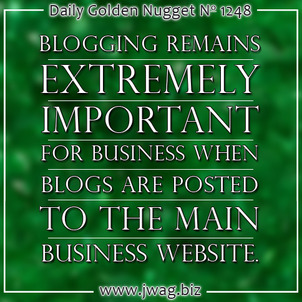
Before social media, there was Blogging.
Blogging has passed through various evolutions in the years since its original inception in 1994. The first blogs were created to help people keep their friends up to date with what they were doing. Services like Open Diary, Slashdot, and LiveJournal were eventually created to make it easy for friends to keep one another updated.
Sounds like the function of social media doesn't it?
Through the evolution of the social networks MySpace, FriendFinder, Facebook, Twitter, Tumblr, Google+, and many others, the need for a personal blog seems to have dwindled. Why bother maintaining your own blogging site to talk about your feelings when you can just do that through your favorite social network now?
Some might say that there's no point in it anymore, and they might be right; that is, if your only purpose for blogging is to talk about yourself, personal situations, and your feelings. Social media platforms have completely replaced the need to set up your own blogging platform for those activities.
However, the word "blogging" has also evolved into an amorphous term to represent all the content creation strategies that include writing. For example...
* Want to post your newsletter on your site but don't have a dedicated newsletter section? Then post each newsletter article into the blog instead.
* Want to tell customers about the upcoming event you're going to hold or attend but you don't have an events section on your website? Then post the details in your blog.
* Want to publish photos of that event after it's over but you don't have an online photo gallery? Then post them to your blog.
* Want to post the winners of your latest contest somewhere permanently on your website? The blog is good for that too.
The blog is nothing if not versatile.
There's a big difference between blogging for personal reasons and blogging for business. You many not care if anyone reads your personal blog, and they seem to get lost in the abysses of blogging platforms, like WordPress, Blogger, Tumblr, and Medium. On the other hand, it's a waste of business resources if people don't find and read your business blog.
It wouldn't make sense to post your newsletter, event announcements, photos, and contest winners to one of those blogging platforms because the audience who should read those things won't easily find them. Sure, photos could be posted to your business social media account, but they should first be archived to the website you control.
I've never liked using the blogging platforms for business. The versatility of blog uses makes them a perfect way to keep your customers up to date with current events and it also serves as an archive for new customers to peruse after finding you through a search engine. You see, maintaining a blog on your own website over time will establish long term organic traffic benefits from Google and Bing.
More specifically, you must maintain a blog as a folder on your website, e.g. http://www.domainname.com/blog, because Google and Bing will recognize that folder as part of your website. On the other hand, a blogging platform would set up a website address of http://blog.domainname.com, which Google and Bing will recognize as a completely different website.
Maintaining a single website for all your activity and information helps to build your authority in your field, and on those related topics. When using a blogging platform, you are dividing your authority between your website and that platform.
Although the blog is a good way to keep your customers up to date, it could be argued that that task should be handled on social media. While this is certainly true, it's better to post to your on-site blog first, and then share a teaser description to social media. Additionally, you should post to the blog and then email a teaser description to your customers.
Like email, it doesn't seem like blogging will ever go away. I expect the platforms through which we blog will continue to change, but the process will remain constant. Maybe the name blogging will be replaced by something else. Actually, many people involved with internet marketing already call it content creation, but I don't expect will catch on as a phrase unless we shorten it to "ConCre" or something.
So, in short, blogging is still important for business... just as long as you are blogging on your website.








